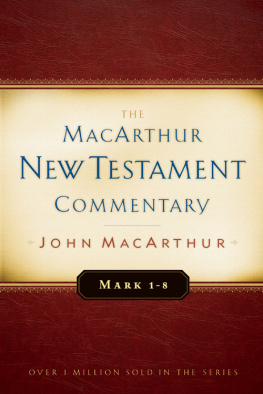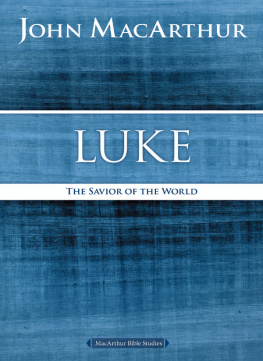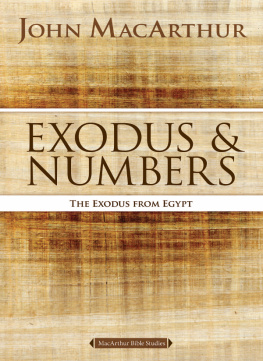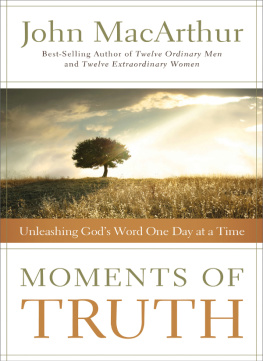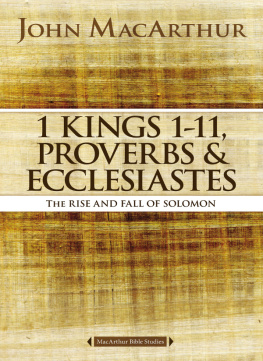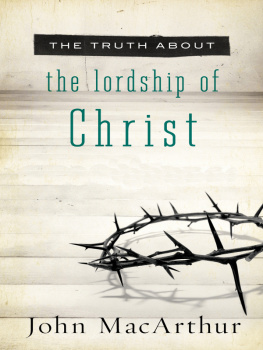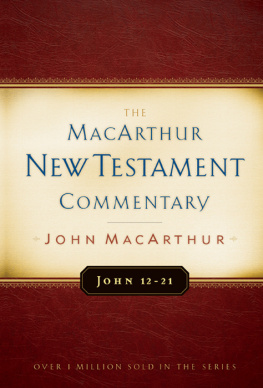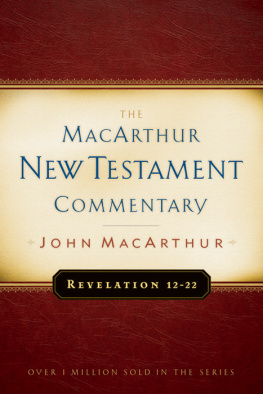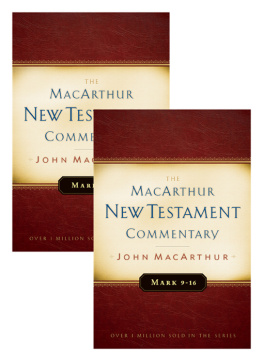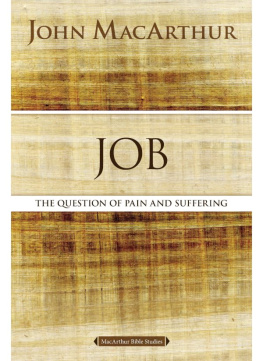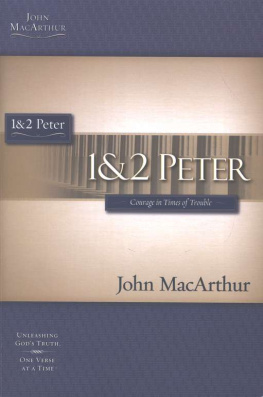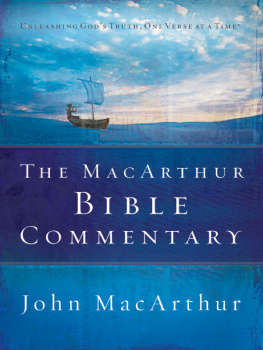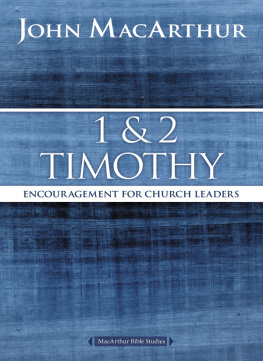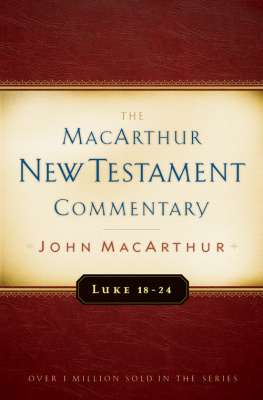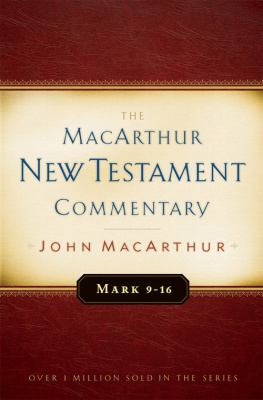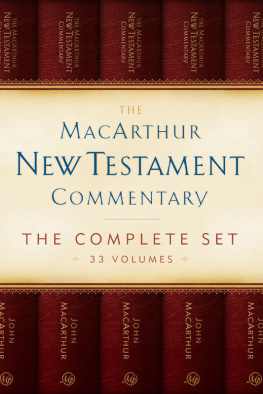
2015 by
JOHN MACARTHUR
All rights reserved. No part of this book may be reproduced in any form without permission in writing from the publisher, except in the case of brief quotations embodied in critical articles or reviews.
All Scripture quotations, unless otherwise indicated, are taken from the New American Standard Bible, Copyright 1960, 1962, 1963, 1968, 1971, 1972, 1973, 1975, 1977, 1995 by The Lockman Foundation. Used by permission. (www.Lockman.org)
Scripture quotations marked ESV are taken from The Holy Bible, English Standard Version. Copyright 2000, 2001 by Crossway Bibles, a division of Good News Publishers. Used by permission. All rights reserved.
Scripture quotations marked NKJV are taken from the New King James Version. Copyright 1982 by Thomas Nelson, Inc. Used by permission. All rights reserved.
Scripture quotations marked KJV are taken from the King James Version.
Cover Design: Smartt Guys design
Library of Congress Cataloging-in-Publication Data
MacArthur, John
Mark 1-8 / John MacArthur.
pages cm. (The MacArthur New Testament commentary)
Includes bibliographical references and index.
ISBN 978-0-8024-1030-6
1. Bible. Mark, I-VIIICommentaries. I. Title.
BS2585.53.M225 2015
226.3077dc23
2014033026
We hope you enjoy this book from Moody Publishers. Our goal is to provide high-quality, thought-provoking books and products that connect truth to your real needs and challenges. For more information on other books and products written and produced from a biblical perspective, go to www.moodypublishers.com or write to:
Moody Publishers
820 N. LaSalle Boulevard
Chicago, IL 60610
1 3 5 7 9 10 8 6 4 2
Printed in the United States of America
To Chris Hamilton
a man among men, a friend among friends, and a leader among leaders
Contents
Friend,
Thank you for choosing to read this Moody Publishers title. It is our hope and prayer that this book will help you to know Jesus Christ more personally and love Him more deeply.
The proceeds from your purchase help pay the tuition of students attending Moody Bible Institute. These students come from around the globe and graduate better equipped to impact our world for Christ.
Other Moody Ministries that may be of interest to you include Moody Radio and Moody Distance Learning. To learn more visit http://www.moodyradio.org/ and http://www.moody.edu/distance-learning/
To enhance your reading experience weve made it easy to share inspiring passages and thought-provoking quotes with your friends via Goodreads, Facebook, Twitter, and other book-sharing sites. To do so, simply highlight and forward. And dont forget to put this book on your Reading Shelf on your book community site.
Thanks again, and may God bless you.
The Moody Publishers Team
It continues to be a rewarding, divine communion for me to preach expositionally through the New Testament. My goal is always to have deep fellowship with the Lord in the understanding of His Word and out of that experience to explain to His people what a passage means. In the words of Nehemiah 8:8, I strive to give the sense of it so they may truly hear God speak and, in so doing, may respond to Him.
Obviously, Gods people need to understand Him, which demands knowing His Word of Truth (2 Tim. 2:15) and allowing that Word to dwell in them richly (Col. 3:16). The dominant thrust of my ministry, therefore, is to help make Gods living Word alive to His people. It is a refreshing adventure.
This New Testament commentary series reflects this objective of explaining and applying Scripture. Some commentaries are primarily linguistic, others are mostly theological, and some are mainly homiletical. This one is basically explanatory, or expository. It is not linguistically technical but deals with linguistics when that seems helpful to proper interpretation. It is not theologically expansive but focuses on the major doctrines in each text and how they relate to the whole of Scripture. It is not primarily homiletical, although each unit of thought is generally treated as one chapter, with a clear outline and logical flow of thought. Most truths are illustrated and applied with other Scripture. After establishing the context of a passage, I have tried to follow closely the writers development and reasoning.
My prayer is that each reader will fully understand what the Holy Spirit is saying through this part of His Word, so that His revelation may lodge in the mind of believers and bring greater obedience and faithfulnessto the glory of our great God.
The beginning of the gospel of Jesus Christ, the Son of God (1:1). Those opening words to Marks gospel not only state the purpose behind its composition but may have served as its original title. However, like the other three gospels, the work has been known throughout church history by the name of its author.
Mark appears several times in the book of Acts, where his name is given as John who was also called Mark (Acts 12:12, 25; cf. 15:37, 39). He was a cousin of Barnabas (Col. 4:10), and his mothers home in Jerusalem served as a gathering place for the early church (Acts 12:12). As a presumably young man, John Mark accompanied Paul and Barnabas on their first missionary journey (Acts 12:25; 13:5). But he deserted them at Perga in Pamphylia (Acts 13:13). As a result of Marks inexcusable failure, Paul refused to take him on a subsequent trip (Acts 15:3738). The issue sparked a sharp disagreement between Paul and Barnabas, causing them to part ways (Acts 15:39). Barnabas took Mark with him to Cyprus while Paul embarked on a second missionary journey with Silas (Acts 15:3941).
Though he had betrayed Pauls trust on the first missionary journey, John Mark later became a valued member of the apostles ministry team. In Colossians 4:1011, Paul instructed his readers to welcome Mark as one of his fellow workers for the kingdom who had proven to be an encouragement to him during his first Roman imprisonment (cf. Philem. 24). Some years later, near the end of his life, Paul asked Timothy to pick up Mark and bring him with you, for he is useful to me for service (2 Tim. 4:11).
It is likely that John Mark was restored to ministry usefulness, at least in part, through the mentorship of Peter. As a leader in the Jerusalem church, Peter was familiar with the house of Marks mother (Acts 12:12) and may have met Mark through her. The friendship between Peter and Mark was such that the apostle became a spiritual father figure to Mark, referring to him as my son (1 Peter 5:13). If anyone understood the process of restoration after failure, it was Peter, who was graciously restored by Christ after denying Him three times (cf. John 18:1517, 2527; 21:1517). Peters influence undoubtedly helped Mark overcome the weaknesses and vacillations of his youth so that he could faithfully accomplish what God had called him to do.
AUTHOR
Like the other three, the second gospel does not include the name of its author. However, the universal testimony of the early church confirms it was penned by Mark. The early church father Papias of Hieropolis, writing sometime between A.D. 95140, explained that Marks content was derived from the sermons of Peter, an observation consistent with their close relationship. According to Papias,
Mark having become the interpreter of Peter, wrote down accurately whatsoever he remembered. It was not, however, in exact order that he related the sayings or deeds of Christ. For he neither heard the Lord nor accompanied Him. But afterwards, as I said, he accompanied Peter, who accommodated his instructions to the necessities [of his hearers], but with no intention of giving a regular narrative of the Lords sayings. Wherefore Mark made no mistake in thus writing some things as he remembered them. For of one thing he took especial care, not to omit anything he had heard, and not to put anything fictitious into the statements. (

